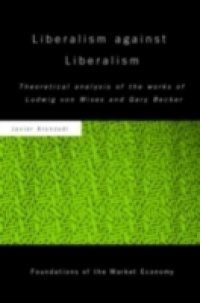The defence of the market and economic freedom have been the main objectives of the investigations by liberal thinkers such as Milton Friedman, Gary Becker, F Hayek and L Von Mises. Bearing in mind that the first two economists are the maximum exponents of the Chicago School and the last two of the Austrian School, it is often concluded that the theories of both schools are similar. This book demonstrates that in reality, there is no convergence or complementariness to be found between both schools of thought. The anthropological categories, contributed by Mises, allow us to understand all human phenomena from the view of the man who acts. In this view, economics is part of a philosophical system whose core is the creative capacity of people. Becker's work, on the other hand, is concentrated on the generalization of the homo economicus as the basis for explaining all human behaviour. He generalizes the maximizing principle to explain all human reality, and extends the scope of the application of a so-called scientific and technical view of the world. In this key volume, an important read for those in the fields of economic theory and political economy, Javier Aranzadi argues, in essence, that the tradition of Hayek and Mises encourages a humanistic liberalism, whereas the Chicago School proposes only a technical humanism.

